We wouldn’t dream of abandoning our vast semi–annual Most Anticipated Book Previews, but we thought a monthly reminder would be helpful (and give us a chance to note titles we missed the first time around). Here’s what we’re looking out for this month. Let us know what you’re looking forward to in the comments!
Want to know about the books you might have missed? Then go read our most recent book preview. Want to help The Millions keep churning out great books coverage? Then sign up to be a member today.
 Leave the World Behind by Rumaan Alam: “Step into our beautiful house and leave the world behind,” reads the Airbnb posting for the charming Hamptons house rented by a Brooklyn family for a one-week vacation. The world has other ideas. Shortly into their stay, the East Coast power grid goes down, New York City is plunged into darkness, warplanes roar across the sky—the sonic boom “a rend in heaven right above their little house”—and, worse, the rental home’s owners appear at the front door. An exquisitely tense novel of manners in the midst of a catastrophe from which there is no safe haven, however well-furnished. (Matt)
Leave the World Behind by Rumaan Alam: “Step into our beautiful house and leave the world behind,” reads the Airbnb posting for the charming Hamptons house rented by a Brooklyn family for a one-week vacation. The world has other ideas. Shortly into their stay, the East Coast power grid goes down, New York City is plunged into darkness, warplanes roar across the sky—the sonic boom “a rend in heaven right above their little house”—and, worse, the rental home’s owners appear at the front door. An exquisitely tense novel of manners in the midst of a catastrophe from which there is no safe haven, however well-furnished. (Matt)
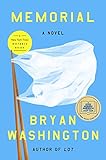 Memorial by Bryan Washington: In the follow-up to his 2019 story collection, Lot, Washington introduces us to Mike and Benson. They’re a couple, and though they haven’t been together forever, their relationship has lasted long enough for them to both become vaguely dissatisfied. Their rather boring comfort gets shaken up by the arrival of Mike’s mother, Mitsuko, from Japan: she reveals that his father is dying, and while Mike travels to Osaka to, Mitsuko stays behind with Benson. The result is not only an exploration of a kaleidoscopically diverse America—Mike is a Japanese American man who works at a Mexican restaurant and dates a Black man—but a moving portrait of two young men who are figuring out exactly who they are in this world. Anyone who enjoyed Washington’s dreamlike yet textured meditations on life in Houston in Lot will be enchanted with Memorial. (Ismail)
Memorial by Bryan Washington: In the follow-up to his 2019 story collection, Lot, Washington introduces us to Mike and Benson. They’re a couple, and though they haven’t been together forever, their relationship has lasted long enough for them to both become vaguely dissatisfied. Their rather boring comfort gets shaken up by the arrival of Mike’s mother, Mitsuko, from Japan: she reveals that his father is dying, and while Mike travels to Osaka to, Mitsuko stays behind with Benson. The result is not only an exploration of a kaleidoscopically diverse America—Mike is a Japanese American man who works at a Mexican restaurant and dates a Black man—but a moving portrait of two young men who are figuring out exactly who they are in this world. Anyone who enjoyed Washington’s dreamlike yet textured meditations on life in Houston in Lot will be enchanted with Memorial. (Ismail)
 The Silence by Don DeLillo: The prerelease literature for DeLillo’s The Silence takes pains to note that DeLillo completed his new novel mere weeks before the advent of Covid-19. One understands why when one reads the plot summary: Five people on Super Bowl Sunday in the near future, trapped together in a Manhattan apartment in the midst of an ongoing catastrophe. In The Silence, DeLillo trains his postmodern meditative powers on what happens when our connection to technology is severed, and asks what ultimately makes us human. As Joshua Ferris writes in The New York Times Book Review: “DeLillo offers consolation simply by enacting so well the mystery and awe of the real world.” (Adam Price)
The Silence by Don DeLillo: The prerelease literature for DeLillo’s The Silence takes pains to note that DeLillo completed his new novel mere weeks before the advent of Covid-19. One understands why when one reads the plot summary: Five people on Super Bowl Sunday in the near future, trapped together in a Manhattan apartment in the midst of an ongoing catastrophe. In The Silence, DeLillo trains his postmodern meditative powers on what happens when our connection to technology is severed, and asks what ultimately makes us human. As Joshua Ferris writes in The New York Times Book Review: “DeLillo offers consolation simply by enacting so well the mystery and awe of the real world.” (Adam Price)
 The Hole by Hiroko Oyamada (translated by David Boyd): Fans of Oyamada’s The Factory— a curious and delightfully eccentric novel that follows four workers through their jobs at a Kafkaesque labyrinthine factory—will be delighted to know that New Directions is publishing the English translation of Oyamada’s follow-up novel, The Hole. Work figures into this book too: when a couple relocates to a rural area for the husband’s job, the wife is left with an abundance of time. She explores the countryside, finding various unlikely creatures, and particularly a hole that seems to be made just for her, in this novel that is “by turns reminiscent of Lewis Carroll, David Lynch, and My Neighbor Totoro.” (Anne)
The Hole by Hiroko Oyamada (translated by David Boyd): Fans of Oyamada’s The Factory— a curious and delightfully eccentric novel that follows four workers through their jobs at a Kafkaesque labyrinthine factory—will be delighted to know that New Directions is publishing the English translation of Oyamada’s follow-up novel, The Hole. Work figures into this book too: when a couple relocates to a rural area for the husband’s job, the wife is left with an abundance of time. She explores the countryside, finding various unlikely creatures, and particularly a hole that seems to be made just for her, in this novel that is “by turns reminiscent of Lewis Carroll, David Lynch, and My Neighbor Totoro.” (Anne)
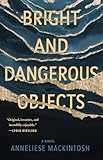 Bright and Dangerous Objects by Anneliese Mackintosh: A beautiful novel about an undersea welder who juggles her desire to join a mission to Mars with the reality of her pregnancy. This is a lovely and fascinating book about the kind of work that is usually invisible, and a kind of maternal ambivalence that reaches for the literal stars, told from the perspective of a singular, well-drawn protagonist. (Lydia)
Bright and Dangerous Objects by Anneliese Mackintosh: A beautiful novel about an undersea welder who juggles her desire to join a mission to Mars with the reality of her pregnancy. This is a lovely and fascinating book about the kind of work that is usually invisible, and a kind of maternal ambivalence that reaches for the literal stars, told from the perspective of a singular, well-drawn protagonist. (Lydia)
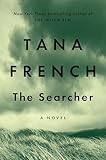 The Searcher by Tana French: French, who made her name writing six bestselling mysteries starring detectives from the fictional Dublin Murder Squad, has branched out into stand-alone books. In this one, a retired Chicago cop buys a house in a rural town in Ireland’s Lonesome West, hoping to put police work behind him. But of course trouble finds him in the form of a local boy from a dysfunctional family who needs help finding his missing brother. If you are a French obsessive, you don’t need to know the rest. Just pre-order and call in sick for a couple days after Oct. 6 when the book comes out. (Michael)
The Searcher by Tana French: French, who made her name writing six bestselling mysteries starring detectives from the fictional Dublin Murder Squad, has branched out into stand-alone books. In this one, a retired Chicago cop buys a house in a rural town in Ireland’s Lonesome West, hoping to put police work behind him. But of course trouble finds him in the form of a local boy from a dysfunctional family who needs help finding his missing brother. If you are a French obsessive, you don’t need to know the rest. Just pre-order and call in sick for a couple days after Oct. 6 when the book comes out. (Michael)
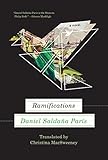 Ramifications by Daniel Saldaña París (translated by Christina MacSweeney): A young man works through the aftermath of his mother’s abandonment when he was a young child, from the author of the critically acclaimed Among Strange Victims. (Lydia)
Ramifications by Daniel Saldaña París (translated by Christina MacSweeney): A young man works through the aftermath of his mother’s abandonment when he was a young child, from the author of the critically acclaimed Among Strange Victims. (Lydia)
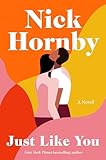 Just Like You by Nick Hornby: The much-loved author of High Fidelity, About a Boy, and other hits is out with another unlikely romance—this one between Lucy, a nearly divorced 41-year-old schoolteacher with two sons, and Joseph, a part-time butcher half her age who’s still living at home with his mom. When they meet, Lucy’s looking for a babysitter but winds up with something more. In this age of lockdowns and social distancing, the novel asks timely questions about how people manage to connect when confronted with seemingly insurmountable obstacles. Sometimes, this brutally funny novel suggests, the perfect match might be the person who’s utterly unlike you. (Bill)
Just Like You by Nick Hornby: The much-loved author of High Fidelity, About a Boy, and other hits is out with another unlikely romance—this one between Lucy, a nearly divorced 41-year-old schoolteacher with two sons, and Joseph, a part-time butcher half her age who’s still living at home with his mom. When they meet, Lucy’s looking for a babysitter but winds up with something more. In this age of lockdowns and social distancing, the novel asks timely questions about how people manage to connect when confronted with seemingly insurmountable obstacles. Sometimes, this brutally funny novel suggests, the perfect match might be the person who’s utterly unlike you. (Bill)
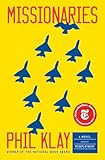 Missionaries by Phil Klay: Despite soul-sapping fatigue, a soldier-medic adept at patching up the war wounded and a journalist equally adept at covering American war find the chance to enter yet another conflict zone irresistible. A calling of sorts. But whence the call? From its appeal to ego—the belief that one is among the favored few tasked with making things right in the world? As acolytes to violence, if not by preference then by necessity? With Missionaries, Klay, winner of the National Book Award in 2014, has dropped a novel on us of a muscular veracity as terrifying and important as it is rare in contemporary writing. (Il’ja)
Missionaries by Phil Klay: Despite soul-sapping fatigue, a soldier-medic adept at patching up the war wounded and a journalist equally adept at covering American war find the chance to enter yet another conflict zone irresistible. A calling of sorts. But whence the call? From its appeal to ego—the belief that one is among the favored few tasked with making things right in the world? As acolytes to violence, if not by preference then by necessity? With Missionaries, Klay, winner of the National Book Award in 2014, has dropped a novel on us of a muscular veracity as terrifying and important as it is rare in contemporary writing. (Il’ja)
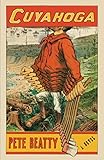 Cuyahoga by Pete Beatty: Debut novel Cuyahoga by Pete Beatty ‘defies all modest description” according to Brian Phillips. The novel’s a mix of tragedy and farce that evokes the kitchen sink of classics (high and low): the Greek classics and the Bible alongside nods to Looney Tunes, Charles Portis, and Flannery O’Connor. Set in 1837 Ohio, Medium Son narrates the tale of Big Son, who looks for a steady wage and in doing so stumbles into a series of misadventures that involve (but are not limited to) elderly terrorists, infrastructure collapse, steamboat races, wild pigs, and multiple ruined weddings. A boisterous adventure, Cuyahoga at its essence, per Phillips, is “a ramshackle joy from start to finish.” (Anne)
Cuyahoga by Pete Beatty: Debut novel Cuyahoga by Pete Beatty ‘defies all modest description” according to Brian Phillips. The novel’s a mix of tragedy and farce that evokes the kitchen sink of classics (high and low): the Greek classics and the Bible alongside nods to Looney Tunes, Charles Portis, and Flannery O’Connor. Set in 1837 Ohio, Medium Son narrates the tale of Big Son, who looks for a steady wage and in doing so stumbles into a series of misadventures that involve (but are not limited to) elderly terrorists, infrastructure collapse, steamboat races, wild pigs, and multiple ruined weddings. A boisterous adventure, Cuyahoga at its essence, per Phillips, is “a ramshackle joy from start to finish.” (Anne)
 The Lost Shtetl by Max Gross: In Gross’s debut novel, a disintegrating marriage inadvertently reveals a larger secret: the existence of a tiny Jewish village in Poland called Kreskol. Isolated (in equal measure) from the horrors, advancements, and culture of the 20th century, its residents must come to terms with their new reality—and long-hidden origin story. A starred review from Publishers Weekly says: “Gross’s entertaining, sometimes disquieting tale delivers laugh-out-loud moments and deep insight on human foolishness, resilience, and faith.” (Carolyn)
The Lost Shtetl by Max Gross: In Gross’s debut novel, a disintegrating marriage inadvertently reveals a larger secret: the existence of a tiny Jewish village in Poland called Kreskol. Isolated (in equal measure) from the horrors, advancements, and culture of the 20th century, its residents must come to terms with their new reality—and long-hidden origin story. A starred review from Publishers Weekly says: “Gross’s entertaining, sometimes disquieting tale delivers laugh-out-loud moments and deep insight on human foolishness, resilience, and faith.” (Carolyn)
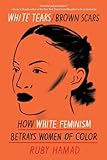 White Tears/Brown Scars by Ruby Hamad: Born out of her viral Guardian article from 2018 ( “How White Women Use Strategic Tears to Silence Women of Color”), Hamad’s first book explores the ways white feminism has been used to uphold white supremacy and oppress Black and Indigenous women, and women of color. Blending history, research, and cultural criticism, Zeba Talkhani calls the book “an essential guide for those who want to be truly intersectional in their feminism.” (Carolyn)
White Tears/Brown Scars by Ruby Hamad: Born out of her viral Guardian article from 2018 ( “How White Women Use Strategic Tears to Silence Women of Color”), Hamad’s first book explores the ways white feminism has been used to uphold white supremacy and oppress Black and Indigenous women, and women of color. Blending history, research, and cultural criticism, Zeba Talkhani calls the book “an essential guide for those who want to be truly intersectional in their feminism.” (Carolyn)
 Plain Bad Heroines by Emily M. Danforth: Danforth’s debut adult novel weaves together stories (and stories within stories) centered around Brookhants School for Girls, a shuttered and haunted New England boarding school. Deeply metafictional, mysterious, and queer, the novel explores the ways the past and the present converge in horrifying and spectacular ways. “Brimming from start to finish with sly humor and gothic mischief, Plain Bad Heroines is a brilliant piece of exuberant storytelling by a terrifically talented author,” says Sarah Waters. (Carolyn)
Plain Bad Heroines by Emily M. Danforth: Danforth’s debut adult novel weaves together stories (and stories within stories) centered around Brookhants School for Girls, a shuttered and haunted New England boarding school. Deeply metafictional, mysterious, and queer, the novel explores the ways the past and the present converge in horrifying and spectacular ways. “Brimming from start to finish with sly humor and gothic mischief, Plain Bad Heroines is a brilliant piece of exuberant storytelling by a terrifically talented author,” says Sarah Waters. (Carolyn)
 Earthlings by Sayaka Murata (translated by Ginny Tapley Takemori): In a follow-up to her wildly successful English-language debut, Convenience Store Woman, Murata’s newest novel follows Natsuki, a girl who believes she’s an alien. Ignored, abused, and painfully lonely, she grows up but never fits into society; she dreams of escaping the “factory” (modern Japanese society) for her true home: space. Elif Bautman calls the novel “A radical, hilarious, heartbreaking look at the crap we have all internalized in order to fit in and survive.” (Carolyn)
Earthlings by Sayaka Murata (translated by Ginny Tapley Takemori): In a follow-up to her wildly successful English-language debut, Convenience Store Woman, Murata’s newest novel follows Natsuki, a girl who believes she’s an alien. Ignored, abused, and painfully lonely, she grows up but never fits into society; she dreams of escaping the “factory” (modern Japanese society) for her true home: space. Elif Bautman calls the novel “A radical, hilarious, heartbreaking look at the crap we have all internalized in order to fit in and survive.” (Carolyn)
 A Woman, A Plan, An Outline of a Man by Sarah Kasbeer: Winner of Zone 3 Press’s 2019 Creative Nonfiction Award, Kasbeer’s debut essay collection explores girlhood, sexuality, trauma, shame, and hope. “An astonishing collection not for the faint of heart,” says Chloe Caldwell. “Kasbeer speaks the unspoken and dares to be vulnerable in a world of facades.” (Carolyn)
A Woman, A Plan, An Outline of a Man by Sarah Kasbeer: Winner of Zone 3 Press’s 2019 Creative Nonfiction Award, Kasbeer’s debut essay collection explores girlhood, sexuality, trauma, shame, and hope. “An astonishing collection not for the faint of heart,” says Chloe Caldwell. “Kasbeer speaks the unspoken and dares to be vulnerable in a world of facades.” (Carolyn)
 Tiny Nightmares edited by Lincoln Michel and Nadxieli Nieto: In their second “tiny” anthology, editors Michel and Nieto gather 40 established and emerging writers— including Samantha Hunt, Jac Jemc, and Hilary Leichter—to spin small tales of terror. About the little horrors, Carmen Maria Machado says: “I could gorge myself all day and night on these macabre, hellish little literary bonbons…Tiny Nightmares is an absolute treat.” (Carolyn)
Tiny Nightmares edited by Lincoln Michel and Nadxieli Nieto: In their second “tiny” anthology, editors Michel and Nieto gather 40 established and emerging writers— including Samantha Hunt, Jac Jemc, and Hilary Leichter—to spin small tales of terror. About the little horrors, Carmen Maria Machado says: “I could gorge myself all day and night on these macabre, hellish little literary bonbons…Tiny Nightmares is an absolute treat.” (Carolyn)









